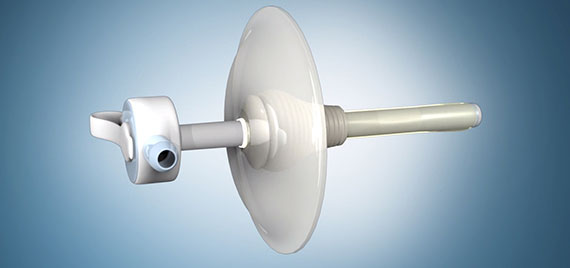Protolabs has announced MedStar Health and Cleveland Clinic Innovations as joint winners of the Cool Idea Award: Healthcare Grant. These grants provide in-kind manufacturing services to support development of medical products, spurring innovation in the field.
“Protolabs is proud to champion innovation in the medical field,” says Vicki Holt, president & CEO of Protolabs. “These healthcare grants and the manufacturing services that come with them help important health-focused projects improve hundreds of thousands of lives each year.”
MedStar Health Concept Improves Feeding Process
MedStar Health’s gravity feed syringe holder simplifies the feeding of newborns who spend their early days in special, temperature-controlled incubators while being cared for in the neonatal intensive care unit (NICU).
The compact device can hold four different sizes of syringes and was designed to be suspended from the top of the incubator or attached to an IV pole expanding its use outside the NICU.

“Protolabs’ assistance will help us move our gravity feed syringe holder from concept to a working part of our neonatal practice,” says its inventor Tiffany Morris, RN, BSN, who works in the NICU at MedStar Franklin Square Medical Center. “Our team hopes this small device can be a major step forward for NICU nursing and potentially for patient care in other settings.”
The Protolabs grant was used to improve the device’s design. The iterative 3D-printing process helped identify several improvements to the prototype, including: smoothing the corners, adding sturdier syringe clips, and incorporating gaskets to keep infants safe while protecting the incubator. Clamps securely fasten the gravity feeder device to an IV pole.
“We are proud that this award recognizes the innovative ideas our MedStar Health associates have to treat people and advance health,” says Stephen Kinsey, director of MedStar Inventor Services. “The award also demonstrates the power of our partnerships with Cleveland Clinic Innovations and Protolabs, as we work together to transform ideas into clinical practice.”
Innovative Feeding Tube Device
Life for people with enteral (feeding) tubes can be difficult. Inventor Andy Williams has struggled with an enteral tube for years. “I was in the hospital in the emergency room on average once a week, sometimes two times a week, for infections caused from leakage around my feeding tube,” says Williams. “I was hospitalized once a month for infections—sometimes for up to a week-long period.”
Williams teamed up with Dr. Eric Blumrosen of Cleveland Clinic in an effort to improve outcomes for these patients. In current practice, a feeding tube is surgically placed directly into the digestive tract, but that interface is prone to significant leakage. The highly acidic fluids can irritate and injure patients such as Williams, requiring emergency room visits and sometimes hospital stays.
The device protects the stoma by forming a wide seal around an enclosed hole into which the tube is inserted. This eliminates issues with friction where the tube rubs against the skin. Also, it provides a more focused opening that enhances the seal surrounding the tube, and allows limited motion of the tube.
“The leak stopper will let bedridden patients lead a more active life,” says Williams. “Right now, for most people who experience leaks, it’s the No. 1 thing on their mind all day. This invention will let them push it to the back of their minds and go on with normal activities.”
Protolabs’ in-kind manufacturing grant gave Cleveland Clinic Innovations access to manufacturing engineers who helped improve the device’s design for commercial use. It also helped fund prototype injection molded parts.
Sources: Press materials received from the company and additional information gleaned from the company’s website.
About the Author
Press releases may be sent to them via [email protected]. Follow Robotics 24/7 on Facebook
Follow Robotics 24/7 on Linkedin
Article topics
Email Sign Up
















